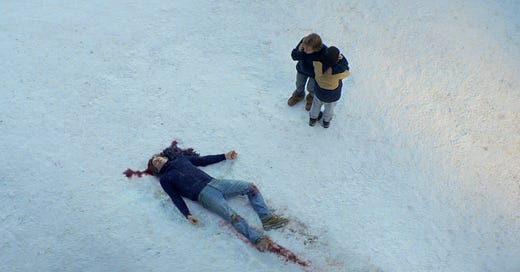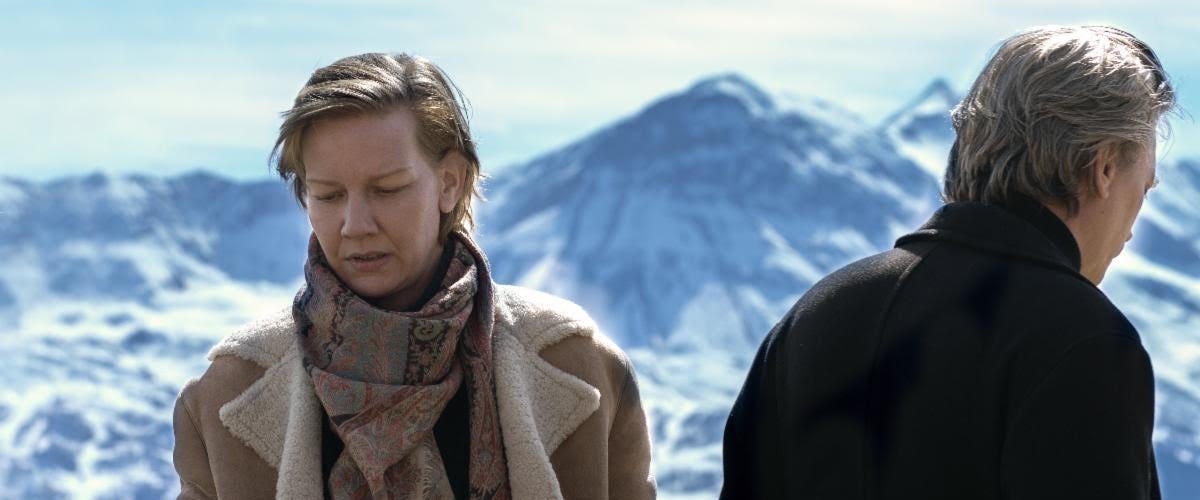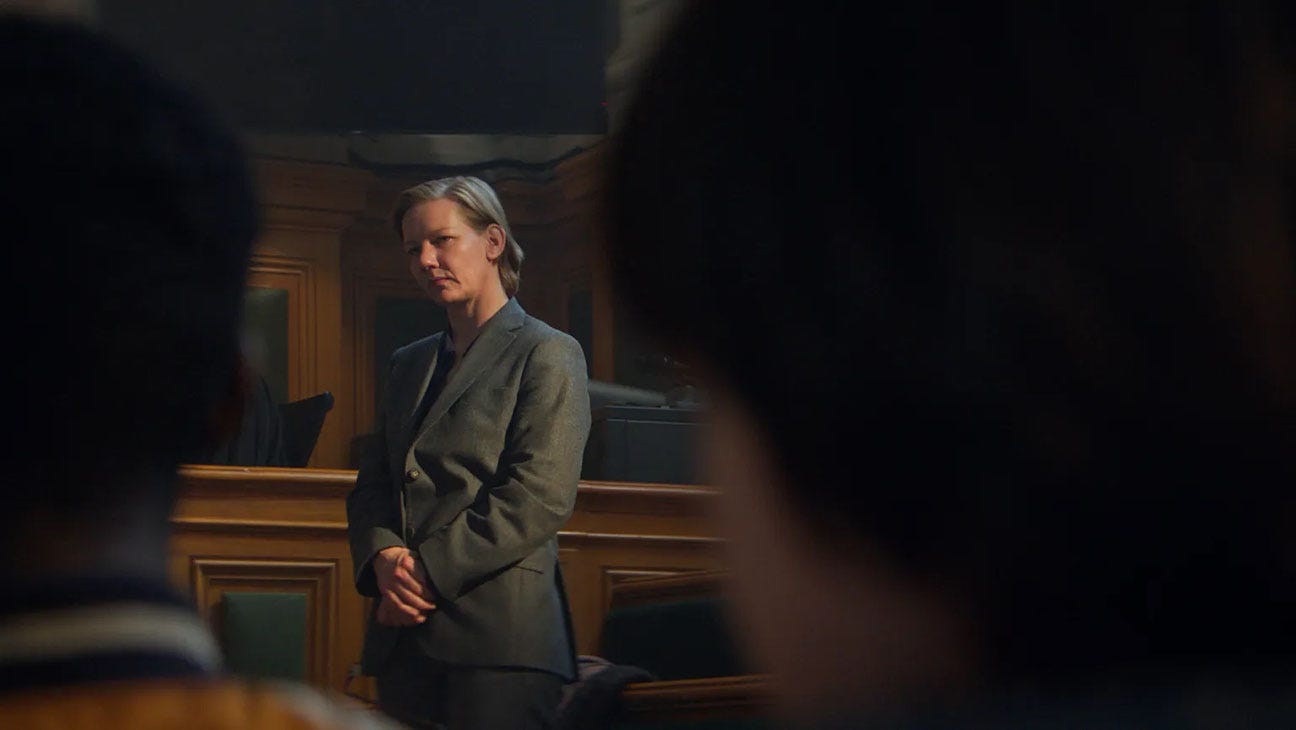"Anatomy of a Fall" is the Best Courtroom Drama of 2023
In Justine Triet's Palme d'Or-winning story of a husband's death, postmodern ambiguity reigns supreme.
In its opening moments, Anatomy of a Fall walks us through the scene of the crime. Sandra (Sandra Hüller), a novelist, sits inside her chalet home in the snow-capped mountains of Grenoble. She is being interviewed by Zoé (Camille Rutherford), a graduate student interested in her work. Their conversation is friendly and jovial, but they are soon interrupted by music blasting from the floor above them. Sandra’s husband Samuel (Samuel Maleski) has begun playing a steel-drum calypso cover of 50 Cent’s “P.I.M.P.” at an ear-splitting volume, something he apparently does on a regular basis while working upstairs. Struggling to hear each other over the cacophony, Sandra and Zoé decide to cut the interview short. Sandra then puts in some earplugs and takes a nap. Meanwhile, Sandra and Samuel’s son Daniel (Milo Machado-Grander), heads out to walk the dog. An hour later, he returns to find his father’s corpse lying in the snow, battered and bloodied. He fell from three stories up.
How did Samuel die? The answer to this question is never certain, especially in this opening sequence, which director Justine Triet presents to us clinically, with an intellectual eye. Did he fall accidentally? This seems unlikely: Forensic evidence points to a discrepancy between the angle of the fall and smatterings of blood on the shed. Other evidence suggests that he was hit with a blunt object before the fall, leaving Sandra—the only person in the house at the time of Samuel’s death—the leading suspect in a subsequent murder investigation. Did Sandra kill her husband?
The greatest accomplishment of Anatomy of a Fall, a postmodern courtroom procedural, is its willingness to withhold the answer to this question through the entirety of its runtime. The film is an exercise in sustained ambiguity: Triet consistently keeps the audience at an arm’s length, refusing to let us know any more than the jury members who become tasked with judging Samuel’s fate. The jury members themselves know little. When the case eventually moves to trial, the lawyers make their claims based on a limited set of facts and subjective testimonies. Do we choose to value the claim that Samuel might have committed suicide? He did just stop his intake of antidepressants. Or do we choose to believe that Sandra, the malicious wife, killed her husband in a manner eerily similar to one of her own novels?
(Worth noting here that French trials operate with a bit more freewheeling frisson than American ones. Judges, lawyers, and witnesses speak openly in front of each other, often interrupting the conversation to assert their own subjective claims. Or, as film critic David Sims described in his recent Letterboxd review: “damn french trials are crazy they’re reading novels and having panel discussions and shit.”)
Anatomy of a Fall shares much of its DNA with Alice Diop’s Saint Omer, another French courtroom drama that released around this time last year. In that film, a young mother of Senegalese origin is put on trial for having drowned her infant daughter, the twist being that the mother fully admits to her crimes. She doesn’t understand how she could have come to do something so heinous as kill her own child, and resultingly blames witchcraft and sorcery—in her mind, there is no other possible explanation. The rest of Saint Omer focuses in on the intricacies of the trial, in which attorneys on either side levy accusations for and against this woman, with little relationship to notions of “objectivity” or “truth.” Her foreign ancestry is of paramount concern to the jury, as is her sex life, neither of which subject brings the trial any closer to consensus. The film ends with the terrifying realization that Truth—at least the kind with a capital “T”—is forever elusive, a terrifying mystery.
Anatomy of a Fall operates under similar pretenses. Triet directs the film with a stoically cerebral eye; she herself refuses to judge any one person, to weigh one piece of evidence over another. The film’s aesthetics are suitably skeptical; they are direct and unflashy. There is little to no dynamism in Simon Beaufils’ cinematography, while the film’s editing, by Laurent Sénéchal, chugs along with calm proceduralism. More important, perhaps, is what the camerawork and editing omit. In the film’s centerpiece sequence, an audio recording of a domestic quarrel between Sandra and Samuel is played before the jury. Triet is generous enough to flash us back to the fight itself, where we watch the married couple argue vehemently about parenting, guilt, and infidelity. Soon the argument turns violent, at which point Triet cuts back to the courtroom. We then watch the discomfited reactions of the trial audience as they listen to the sounds of violent slaps and frustrated screams.
The scene, violently intimate, maintains Triet’s ethos of distanced non-judgmentalism. Do we choose to believe Sandra when she claims that the slapping we heard in the recording was Samuel hitting himself, as he has apparently done before? Or does it seem more likely that Sandra was the one damaging her husband? The film puzzles over these questions for the better part of two and a half hours before its ambiguous conclusion, in which Daniel delivers a speech summarizing the film’s postmodern themes—a speech that might have come off as glib, had it not been written and delivered with the poise of Triet and Arthur Harari’s poetic script.
The film’s performances are impressive; helping this is the fact that the main characters seem to have been based upon the actors playing them. It isn’t an accident that Sandra Hüller plays a character named Sandra, nor that she is a German author living in France—a situation markedly similar to her own. The same rules apply to Samuel Theis, also playing a character named after himself. The result is a set of detailed performances with a lived-in sensibility, with a family dynamic whose passions and resentments organically, palpably, without warning.
Anatomy of a Fall takes its name from Otto Preminger’s classic 1959 courtroom drama Anatomy of a Murder, and for good reason. Preminger’s film was one of the first to focus not on the righteousness of a particular side of the law, but on the rigors of the legal process itself. Paul Biegler (played by James Stewart), the protagonist of Anatomy of a Murder, is not interested defending his client because he believes in his innocence, but because he is excited by the legal challenge. We witness competing claims and stories, leading us to a final legal decision which has less to with the nature of what is Just, Right, and Good than a playfully cynical awareness of the systems that invent truth itself.
Triet’s film takes Preminger’s cynicism and barrels it into the 21st century. Where Anatomy of a Murder used the structure of a courtroom drama to expose the machinations behind our conceptions of reality, Anatomy of a Fall uses the same tools to argue that reality never existed in the first place. We will never know for sure whether Sandra killed her husband: we resultingly choose to believe what we choose based on the subjectivities available to us. (NEON, the film’s distributor, even created the gimmicky website didshedoit.com to poll audiences on Samuel’s fate.)
That single-word difference in the two titles—between “Fall” and “Murder”—implies a gap in meaning so immense that Anatomy of a Fall takes on an altogether new significance, one more suited for a distrustful era. Truth eludes us now more than ever—and Triet, astute filmmaker that she is, knows just how render this terrifying skepticism in cinematic form.






...Your reviews almost always make me want to see the film!
Love your summary of the evolution of these courtroom dramas: "Where Anatomy of a Murder used the structure of a courtroom drama to expose the machinations behind our conceptions of reality, Anatomy of a Fall uses the same tools to argue that reality never existed in the first place." Intriguing.
...It sounds like they do a good job of illustrating the uncomfortable truth of our inability to know what the truth is. I look forward to watching it, curious to see where my inclinations take me.
J'ai adoré le film aussi. Vraiment excellent. La scène de dispute du couple éclaire tout d'un coup le film d'une autre lumière. Très bonne critique. L'as-tu vu sur grand écran. Je l'espère.